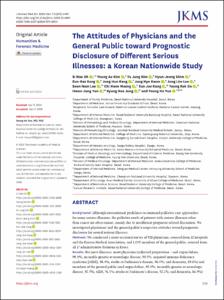KUMEL Repository
1. Journal Papers (연구논문)
1. School of Medicine (의과대학)
Dept. of Internal Medicine (내과학)
The Attitudes of Physicians and the General Public toward Prognostic Disclosure of Different Serious Illnesses: a Korean Nationwide Study
- Keimyung Author(s)
- Do, Young Rok
- Department
- Dept. of Internal Medicine (내과학)
- Journal Title
- Journal of Korean Medical Science
- Issued Date
- 2020
- Volume
- 35
- Issue
- 47
- Abstract
- Background:
Although international guidelines recommend palliative care approaches for many serious illnesses, the palliative needs of patients with serious illnesses other than cancer are often unmet, mainly due to insufficient prognosis-related discussion. We investigated physicians' and the general public's respective attitudes toward prognostic disclosure for several serious illnesses.
Methods:
We conducted a cross-sectional survey of 928 physicians, sourced from 12 hospitals and the Korean Medical Association, and 1,005 members of the general public, sourced from all 17 administrative divisions in Korea.
Results:
For most illnesses, most physicians (adjusted proportions – end-organ failure, 99.0%; incurable genetic or neurologic disease, 98.5%; acquired immune deficiency syndrome [AIDS], 98.4%; stroke or Parkinson's disease, 96.0%; and dementia, 89.6%) and members of the general public (end-organ failure, 92.0%; incurable genetic or neurologic disease, 92.5%; AIDS, 91.5%; stroke or Parkinson's disease, 92.1%; and dementia, 86.9%) wanted to be informed if they had a terminal prognosis. For physicians and the general public, the primary factor to consider when disclosing terminal status was "the patient's right to know his/her condition" (31.0%). Yet, the general public was less likely to prefer prognostic disclosure than physicians. Particularly, when their family members were patients, more than 10% of the general public did not want patients to be informed of their terminal prognosis. For the general public, the main reason for not disclosing prognosis was "psychological burden such as anxiety and depression" (35.8%), while for the physicians it was "disclosure would have no beneficial effect" (42.4%).
Conclusion:
Most Physicians and the general public agreed that disclosure of a terminal prognosis respects patient autonomy for several serious illnesses. The low response rate of physicians might limit the generalizability of the results.
- Keimyung Author(s)(Kor)
- 도영록
- Publisher
- School of Medicine (의과대학)
- Citation
- Si Nae Oh et al. (2020). The Attitudes of Physicians and the General Public toward Prognostic Disclosure of Different Serious Illnesses: a Korean Nationwide Study. Journal of Korean Medical Science, 35(47), e401. doi: 10.3346/jkms.2020.35.e401
- Type
- Article
- ISSN
- 1598-6357
- Source
- https://jkms.org/search.php?where=aview&id=10.3346/jkms.2020.35.e401&code=0063JKMS&vmode=FULL
- Appears in Collections:
- 1. School of Medicine (의과대학) > Dept. of Internal Medicine (내과학)
- 파일 목록
-
-
Download
 oak-2020-0651.pdf
기타 데이터 / 1.99 MB / Adobe PDF
oak-2020-0651.pdf
기타 데이터 / 1.99 MB / Adobe PDF
-
Items in Repository are protected by copyright, with all rights reserved, unless otherwise indicated.